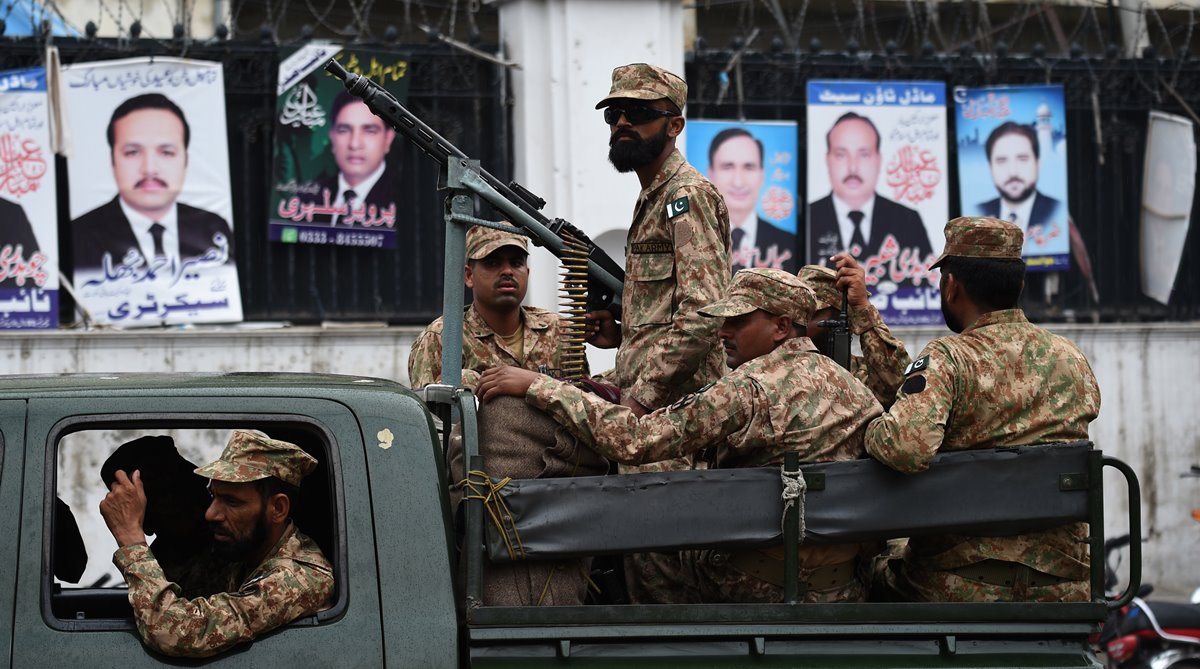Imran Khan shares mental health journey
Imran Khan discusses his ongoing mental health journey, emphasizing the importance of prioritizing wellness and seeking professional support.
Amid accusations of manipulation by the army and concerns over the participation of Islamic hardliners, Pakistanis are voting to elect a new prime minister in the second democratic transition of power.

More than 1.6 million polling staff will perform duties on the election day. About 400,000 police officers and 371,000 army troops have been deployed across the country. (Photo: AFP)
Voting has begun at 85,000 polling stations across the country as Pakistan goes to its 11th general election since 1970 on Wednesday. Nearly 4,00,000 police officers and 371,388 Army personnel are learnt to have been deployed at the booths as a security measure for successful conduct of the Pakistan elections.
Amid accusations of manipulation by the army and concerns over the participation of Islamic hardliners, Pakistanis are voting to elect a new prime minister in the second democratic transition of power.
There are 105.96 million registered voters in the country.
Advertisement
According to the Election Commission of Pakistan (ECP), 3,459 candidates are contesting for 272 general seats of the National Assembly, while 8,396 candidates are running for 577 general seats of the four provincial assemblies — Punjab, Sindh, Balochistan and Khyber-Pakhtunkhwa.
READ | HRCP’s fact-finding report reveals terrible curbs on media
The voting will continue till 6 pm. The counting of votes will be done on the spot immediately after the polling and results will be announced within 24 hours.
The run-up to the elections has seen a massive crackdown on media. There are allegations that the military has secretly backed the campaign of former cricketer Imran Khan, head of Pakistan Tehreek-e Insaf party, while targeting his political opponents.
Since independence in 1947, Pakistan has been ruled by the country’s powerful military through various coups for nearly half of its history.
Questions were raised about the role of the military after reports that it was given magisterial powers. The ECP was also criticised for deploying the Army both inside and outside of polling stations.
Army chief Gen Qamar Bajwa, however, assured that soldiers deployed for election duties would strictly comply with the code of conduct given by the ECP.
OPINION | The tangled skein of Pakistan’s election
He also said the Army would only perform a facilitating role in the polls and that the polling process was to remain under the control and authority of the ECP.
Former prime minister Nawaz Sharif, head of the Pakistan Muslim League-Nawaz (PML-N) who was jailed this month after being convicted in a corruption case, also accused the military of pressuring the judiciary to convict him.
The Human Rights Commission of Pakistan said there were “ample grounds to doubt” the legitimacy of the elections and criticised the “blatant, aggressive and unabashed attempts to manipulate the outcome of the upcoming elections.”
Allowing militant groups to participate in the elections has also raised a lot of questions. Some of the infamous Pakistani extremist leaders are among hundreds of candidates contesting the elections. Candidates from Mumbai-terror attack mastermind Hafiz Saeed-led Jamat-ud Dawa, a banned outfit, are contesting to make Pakistan a “citadel of Islam”.
Saeed’s son and son-in-law are among the candidates.They are among 260 candidates fielded under the umbrella of ‘Allah-o-Akbar Tehreek’, which was registered with the Election Commission in 2011.
READ I Pakistan set for historic election amid charges of army meddling
In 2013, it was for the first time that a civilian government completed its five-year term in Pakistan. A successful conduct of the 2018 general elections will see the second democratic transition of power.
The ECP has taken elaborate measures to ensure that elections are held peacefully and in a fair and transparent manner.
More than 1.6 million polling staff will perform duties on the election day. About 400,000 police officers and 371,000 army troops have been deployed across the country.
The campaign for the Pakistan elections concluded on July 22 midnight after about two months.
Several polls and surveys put Imran Khan’s party marginally ahead, though most suggest it’s going to be a close call.
Khan has pledged to break the decades-old two-party “status quo” of PML-N and its historical rival the Pakistan People’s Party (PPP) — led by Bilawal Bhutto.
Shahbaz Sharif, the president of PML-N, however exuded confidence that his party would win at the centre, and also form the government in Punjab and Khyber-Pakhtukhwa provinces.
On the last day of campaigning, Imran Khan addressed four rallies in the PML-N strongholds in Lahore while PML-N President Shahbaz Sharif concluded his party’s campaign with a public meeting in Dera Ghazi Khan in Punjab, the PML-N base. PPP Chairman Bilawal Bhutto-Zardari addressed supporters in traditional bastion Sind before paying homage at the graves of his assassinated mother Benazir Bhutto and grandfather Zulfikar Ali Bhutto.
Despite a wave of terror attacks in the run-up to the Pakistan elections, thousands packed rallies were held and candidates went from home to home seeking support.
Over 200 people, including three candidates, were killed in terror attacks.
According to an Election Commission official, 5,878 polling stations have been declared “highly sensitive” — official euphemism to mean they are prone to violence — in Sindh, 5,487 in Punjab and Islamabad, 3,874 in Khyber Pakhtunkhwa and FATA and 1,768 in Balochistan.
In a special message, Chief Election Commissioner Justice (retd) Sardar Raza Khan urged people to vote without fail. He promised a free and fair election.
(With agency inputs)
Advertisement